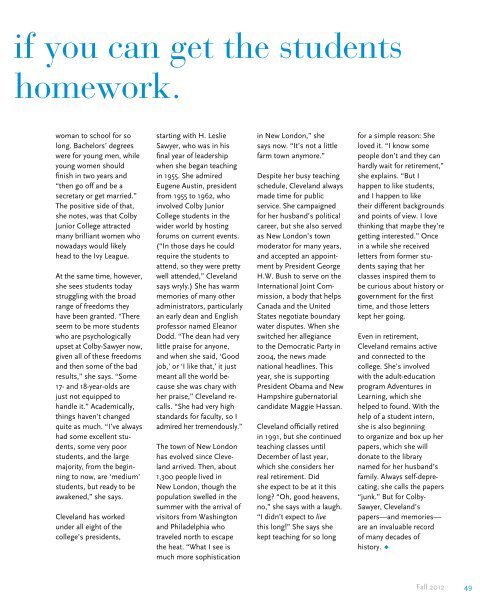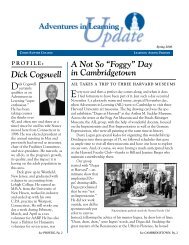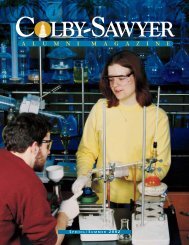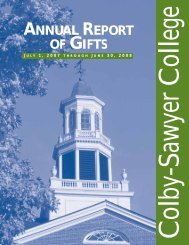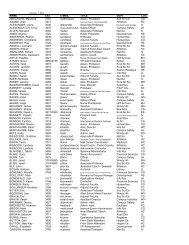Fall 2012 Issue - Colby-Sawyer College
Fall 2012 Issue - Colby-Sawyer College
Fall 2012 Issue - Colby-Sawyer College
You also want an ePaper? Increase the reach of your titles
YUMPU automatically turns print PDFs into web optimized ePapers that Google loves.
if you can get the students<br />
homework.<br />
woman to school for so<br />
long. Bachelors’ degrees<br />
were for young men, while<br />
young women should<br />
finish in two years and<br />
“then go off and be a<br />
secretary or get married.”<br />
The positive side of that,<br />
she notes, was that <strong>Colby</strong><br />
Junior <strong>College</strong> attracted<br />
many brilliant women who<br />
nowadays would likely<br />
head to the Ivy League.<br />
At the same time, however,<br />
she sees students today<br />
struggling with the broad<br />
range of freedoms they<br />
have been granted. “There<br />
seem to be more students<br />
who are psychologically<br />
upset at <strong>Colby</strong>-<strong>Sawyer</strong> now,<br />
given all of these freedoms<br />
and then some of the bad<br />
results,” she says. “Some<br />
17- and 18-year-olds are<br />
just not equipped to<br />
handle it.” Academically,<br />
things haven’t changed<br />
quite as much. “I’ve always<br />
had some excellent students,<br />
some very poor<br />
students, and the large<br />
majority, from the beginning<br />
to now, are ‘medium’<br />
students, but ready to be<br />
awakened,” she says.<br />
Cleveland has worked<br />
under all eight of the<br />
college’s presidents,<br />
starting with H. Leslie<br />
<strong>Sawyer</strong>, who was in his<br />
final year of leadership<br />
when she began teaching<br />
in 1955. She admired<br />
Eugene Austin, president<br />
from 1955 to 1962, who<br />
involved <strong>Colby</strong> Junior<br />
<strong>College</strong> students in the<br />
wider world by hosting<br />
forums on current events.<br />
(“In those days he could<br />
require the students to<br />
attend, so they were pretty<br />
well attended,” Cleveland<br />
says wryly.) She has warm<br />
memories of many other<br />
administrators, particularly<br />
an early dean and English<br />
professor named Eleanor<br />
Dodd. “The dean had very<br />
little praise for anyone,<br />
and when she said, ‘Good<br />
job,’ or ‘I like that,’ it just<br />
meant all the world because<br />
she was chary with<br />
her praise,” Cleveland recalls.<br />
“She had very high<br />
standards for faculty, so I<br />
admired her tremendously.”<br />
The town of New London<br />
has evolved since Cleveland<br />
arrived. Then, about<br />
1,300 people lived in<br />
New London, though the<br />
population swelled in the<br />
summer with the arrival of<br />
visitors from Washington<br />
and Philadelphia who<br />
traveled north to escape<br />
the heat. “What I see is<br />
much more sophistication<br />
in New London,” she<br />
says now. “It’s not a little<br />
farm town anymore.”<br />
Despite her busy teaching<br />
schedule, Cleveland always<br />
made time for public<br />
service. She campaigned<br />
for her husband’s political<br />
career, but she also served<br />
as New London’s town<br />
moderator for many years,<br />
and accepted an appointment<br />
by President George<br />
H.W. Bush to serve on the<br />
International Joint Commission,<br />
a body that helps<br />
Canada and the United<br />
States negotiate boundary<br />
water disputes. When she<br />
switched her allegiance<br />
to the Democratic Party in<br />
2004, the news made<br />
national headlines. This<br />
year, she is supporting<br />
President Obama and New<br />
Hampshire gubernatorial<br />
candidate Maggie Hassan.<br />
Cleveland officially retired<br />
in 1991, but she continued<br />
teaching classes until<br />
December of last year,<br />
which she considers her<br />
real retirement. Did<br />
she expect to be at it this<br />
long? “Oh, good heavens,<br />
no,” she says with a laugh.<br />
“I didn’t expect to live<br />
this long!” She says she<br />
kept teaching for so long<br />
for a simple reason: She<br />
loved it. “I know some<br />
people don’t and they can<br />
hardly wait for retirement,”<br />
she explains. “But I<br />
happen to like students,<br />
and I happen to like<br />
their different backgrounds<br />
and points of view. I love<br />
thinking that maybe they’re<br />
getting interested.” Once<br />
in a while she received<br />
letters from former students<br />
saying that her<br />
classes inspired them to<br />
be curious about history or<br />
government for the first<br />
time, and those letters<br />
kept her going.<br />
Even in retirement,<br />
Cleveland remains active<br />
and connected to the<br />
college. She’s involved<br />
with the adult-education<br />
program Adventures in<br />
Learning, which she<br />
helped to found. With the<br />
help of a student intern,<br />
she is also beginning<br />
to organize and box up her<br />
papers, which she will<br />
donate to the library<br />
named for her husband’s<br />
family. Always self-deprecating,<br />
she calls the papers<br />
“junk.” But for <strong>Colby</strong>-<br />
<strong>Sawyer</strong>, Cleveland’s<br />
papers—and memories—<br />
are an invaluable record<br />
of many decades of<br />
history.<br />
<strong>Fall</strong> <strong>2012</strong><br />
49


